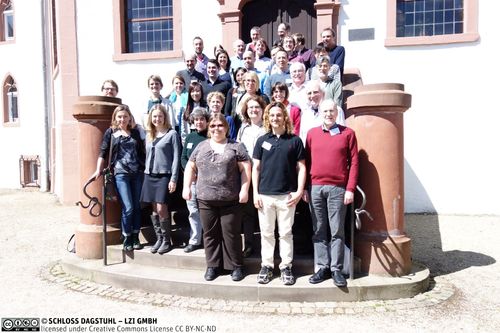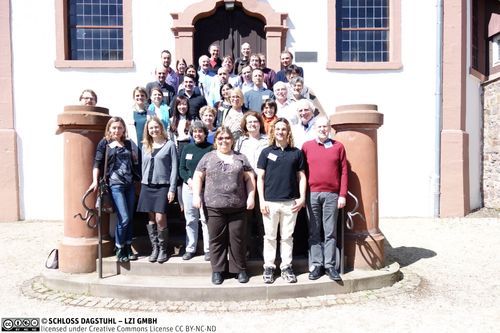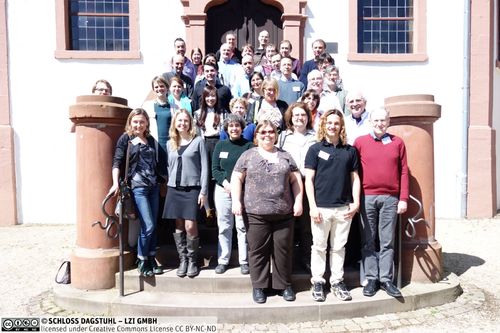Dagstuhl Seminar 16161
Natural Language Argumentation: Mining, Processing, and Reasoning over Textual Arguments
( Apr 17 – Apr 22, 2016 )
Permalink
Organizers
- Elena Cabrio (Laboratoire I3S - Sophia Antipolis, FR)
- Graeme Hirst (University of Toronto, CA)
- Serena Villata (Laboratoire I3S - Sophia Antipolis, FR)
- Adam Wyner (University of Aberdeen, GB)
Contact
- Annette Beyer (for administrative matters)
Schedule
Philosophers and, in more recent years, theorists working largely within Artificial Intelligence have developed formal computational models of argumentation, how it works, and what makes an argument valid or invalid. This work has made substantial progress in abstract, formal models to represent and reason over complex argumentation structures and inconsistent knowledge bases. Relatively little research, however, has applied these computational models to naturally occurring argumentation in text; nor have Computational Linguistics and Natural Language Processing substantially examined argumentation in text. Moreover, much of the work to date has studied only domain-specific texts and use-cases. Examples include finding the specific claims made in a scientific paper and distinguishing argumentation from narrative in legal texts.
But there are many uses and applications for automatic processing of the argumentative aspects of text, such as summarizing the argument of a complex court decision, helping a writer to structure an argument, and processing a large corpus of texts, such as blogs or consumer comments, to find arguments within it. To identify and integrate arguments across a corpus is a very significant problem. To address the issues, solve problems, and build applications, tools must be developed to analyze, aggregate, synthesize, structure, summarize, and reason about arguments in texts. Such tools would enable users to search for particular topics and their justifications, to trace through the argument, and to systematically and formally reason about the relations among arguments. However, to do so requires more linguistic sophistication and newer techniques than currently found in NLP. Moreover, NLP approaches must be connected to computational models of argument. The issues and problems have started to receive attention from both communities; for example, legal documents, on-line debates, product reviews, newspaper articles, court cases, scientific articles, and other kinds of text have all been the subject of recent NLP research on argumentation mining and have been tied to computational models.
Because argumentation is an inherently cross-disciplinary topic involving philosophy, psychology, communications studies, linguistics, and computer science, where different interpretations, analyses, and uses of arguments are proposed and applied, for progress in building NLP tools for argumentation there needs to be progress not only within each domain, but in bridging between these various disciplines, Natural Language Processing, and the computational models. This seminar aims to help build this bridge by bringing together researchers from different disciplines, with the following goals:
- To understand better the specific kinds of tasks that NLP can carry out in argumentation.
- To establish a set of domain-specific and cross-domain use-cases that will guide the direction of research in the field.
- To understand better how computational argumentation tasks are tied -- or not tied -- to their specific domains, such as scientific papers, legal argumentation, and political discussions, looking for new cross-domain generalizations.
- To understand better the technical challenges to success in each of these tasks, and to discuss how the challenges can be addressed.
- To develop and explicate specific challenge problems for the integration of argumentation theory and NLP that are beyond the state of the art (but not too much so), and in which success would have the greatest effect on the field.
- To provide prototype solutions that address issues in the integration of NLP and argumentation theory, and to outline follow-on development.
- To propose or provide preliminary solutions to common open challenges in natural language argumentation (among others: argument retrieval in text, argument summarization, identification of semantic relations among arguments), profiting from the cross-fertilization between researchers coming from the research areas of NLP and formal argumentation.
Philosophers and, in more recent years, theorists working largely within Artificial Intelligence have developed formal computational models of argumentation, how it works, and what makes an argument valid or invalid. This work has made substantial progress in abstract, formal models to represent and reason over complex argumentation structures and inconsistent knowledge bases. Relatively little research, however, has applied these computational models to naturally occurring argumentation in text; nor have Computational Linguistics and Natural Language Processing substantially examined argumentation in text. Moreover, much of the work to date has studied only domain-specific texts and use-cases. Examples include finding the specific claims made in a scientific paper and distinguishing argumentation from narrative in legal texts.
But there are many uses and applications for automatic processing of the argumentative aspects of text, such as summarizing the argument of a complex court decision, helping a writer to structure an argument, and processing a large corpus of texts, such as blogs or consumer comments, to find arguments within it. To identify and integrate arguments across a corpus is a very significant problem. To address the issues, solve problems, and build applications, tools must be developed to analyze, aggregate, synthesize, structure, summarize, and reason about arguments in texts. Such tools would enable users to search for particular topics and their justifications, to trace through the argument, and to systematically and formally reason about the relations among arguments. However, to do so requires more linguistic sophistication and newer techniques than currently found in NLP. Moreover, NLP approaches must be connected to computational models of argument. The issues and problems have started to receive attention from both communities; for example, legal documents, on-line debates, product reviews, newspaper articles, court cases, scientific articles, and other kinds of text have all been the subject of recent NLP research on argumentation mining and have been tied to computational models.
Because argumentation is an inherently cross-disciplinary topic involving philosophy, psychology, communications studies, linguistics, and computer science, where different interpretations, analyses, and uses of arguments are proposed and applied, for progress in building NLP tools for argumentation there needs to be progress not only within each domain, but in bridging between these various disciplines, Natural Language Processing, and the computational models. This seminar aimed to help build this bridge by bringing together researchers from different disciplines, with the following goals:
- To understand better the specific kinds of tasks that NLP can carry out in argumentation.
- To establish a set of domain-specific and cross-domain use-cases that will guide the direction of research in the field.
- To understand better how computational argumentation tasks are tied -- or not tied -- to their specific domains, such as scientific papers, legal argumentation, and political discussions, looking for new cross-domain generalizations.
- To understand better the technical challenges to success in each of these tasks, and to discuss how the challenges can be addressed.
- To develop and explicate specific challenge problems for the integration of argumentation theory and NLP that are beyond the state of the art (but not too much so), and in which success would have the greatest effect on the field.
- To provide prototype solutions that address issues in the integration of NLP and argumentation theory, and to outline follow-on development.
- To propose or provide preliminary solutions to common open challenges in natural language argumentation (among others: argument retrieval in text, argument summarization, identification of semantic relations among arguments), profiting from the cross-fertilization between researchers coming from the research areas of NLP and formal argumentation.
The seminar was held on 17--22 April 2016, with 40 participants from 14 different countries. The event’s seven sessions included 30 talks, two tutorials and a hands-on "unshared" task. The program included several plenary presentations and discussions in smaller working groups. The presentations addressed a variety of topics, as argument mining applied to legal argumentation and to writing support. Collective discussions were arranged for most of these topics, as well as plans for a future interdisciplinary research agenda involving experts from social sciences and psychology.
As a result of the seminar, a number of challenges and open issues have been highlighted:
- At this stage of maturity of the research area, it is difficult to choose good (possibly new) challenges and to define the task(s) to be addressed by automated systems
- Similarly, it is also challenging to precisely define and accomplish annotation task(s) to establish benchmarks and gold standards to test such automated systems
- It is essential to the fruitful development of the research area establish an Interdisciplinary outreach, involving social sciences, psychology, and economics.
Addressing these issues and other questions is now on the agenda of the Argument Mining research community.
 Elena Cabrio, Graeme Hirst, Serena Villata, and Adam Wyner
Elena Cabrio, Graeme Hirst, Serena Villata, and Adam Wyner
- Laura Alonso Alemany (National University - Córdoba, AR) [dblp]
- Michal Araszkiewicz (University Jagiellonski - Krakow, PL) [dblp]
- Kevin D. Ashley (University of Pittsburgh, US) [dblp]
- Pietro Baroni (University of Brescia, IT) [dblp]
- Floris Bex (Utrecht University, NL) [dblp]
- Katarzyna Budzynska (Polish Academy of Sciences - Warsaw, PL) [dblp]
- Elena Cabrio (Laboratoire I3S - Sophia Antipolis, FR) [dblp]
- Claire Cardie (Cornell University, US) [dblp]
- Federico Cerutti (Cardiff University, GB) [dblp]
- Giorgos Flouris (FORTH - Heraklion, GR) [dblp]
- Nancy L. Green (University of North Carolina - Greensboro, US) [dblp]
- Iryna Gurevych (TU Darmstadt, DE) [dblp]
- Ivan Habernal (TU Darmstadt, DE) [dblp]
- Graeme Hirst (University of Toronto, CA) [dblp]
- Eduard H. Hovy (Carnegie Mellon University - Pittsburgh, US) [dblp]
- Anthony Hunter (University College London, GB) [dblp]
- Diane J. Litman (University of Pittsburgh, US) [dblp]
- Bernardo Magnini (Bruno Kessler Foundation - Trento, IT) [dblp]
- Robert Mercer (University of Western Ontario - London, CA) [dblp]
- Marie-Francine Moens (KU Leuven, BE) [dblp]
- Smaranda Muresan (Columbia University - New York, US) [dblp]
- Vincent Ng (University of Texas at Dallas, US) [dblp]
- Sebastian Padó (Universität Stuttgart, DE) [dblp]
- Fabio Paglieri (CNR - Rome, IT) [dblp]
- Alexis M. Palmer (Universität Heidelberg, DE) [dblp]
- Andreas Peldszus (Universität Potsdam, DE) [dblp]
- Ariel Rosenfeld (Bar-Ilan University - Ramat Gan, IL) [dblp]
- Patrick Saint-Dizier (CNRS-Paul Sabatier University - Toulouse, FR) [dblp]
- Jodi Schneider (University of Pittsburgh, US) [dblp]
- Edwin Simpson (TU Darmstadt, DE) [dblp]
- Noam Slonim (IBM - Haifa, IL) [dblp]
- Jan Snajder (University of Zagreb, HR) [dblp]
- Manfred Stede (Universität Potsdam, DE) [dblp]
- Benno Stein (Bauhaus-Universität Weimar, DE) [dblp]
- Simone Teufel (University of Cambridge, GB) [dblp]
- Francesca Toni (Imperial College London, GB) [dblp]
- Leon van der Torre (University of Luxembourg, LU) [dblp]
- Serena Villata (Laboratoire I3S - Sophia Antipolis, FR) [dblp]
- Vern R. Walker (Hofstra University - Hempstead, US) [dblp]
- Zhe Yu (University of Luxembourg, LU) [dblp]
Classification
- artificial intelligence / robotics
- computer graphics / computer vision
- data bases / information retrieval
Keywords
- Argumentation theory
- natural language processing
- text mining
- formal reasoning
- legal reasoning
- persuasion




 Creative Commons BY 3.0 Unported license
Creative Commons BY 3.0 Unported license
